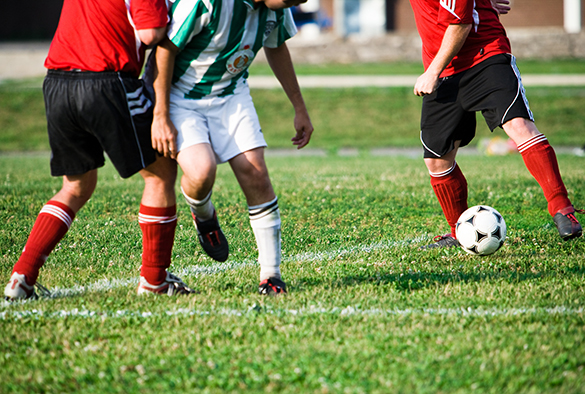Local authorities should intervene to save struggling small town professional football clubs because of the social capital they generate for communities, according to new research by the University of Liverpool.
Sports Economist, Professor David Forrest, from the University’s Management School, distributed 1,200 surveys to residents living around two lower league teams, Bury FC and Luton Town, to assess the value the community places on sustaining a professional football team.
Civic pride
Professor Forrest said: “The revenue the clubs get comes largely from ticket sales, and the people handing that over are active fans of the club. But perhaps other people in the town receive some benefit; in terms of civic pride, public attention and feelings of identity.
“It might be something people like to talk to each other about, or follow in the news. They may even just enjoy hearing the name of their town mentioned when the football results come out.”
Both Bury and Luton are similar in size, with 183,300 and 188,800 residents respectively, and both are home to professional teams whose survival was in peril at the time of the survey. Respondents were reminded of the threat posed to their club and asked, on a scale of zero to £20, how much they would be prepared to contribute to keep their clubs alive. Council tax was chosen as the payment vehicle.
At the time of the survey, both clubs already received some help from their local authorities. Bury through shirt sponsorship, and Luton through a discount on business rates. The value of this support amounted to £50,000 per year (£0.67 per household) for Bury, and £87,000 per year (£1.12 per household) for Luton. The first question on the survey did not mention this, the second question revealed the support already in place and asked how much of an additional contribution each resident would be prepared to make.
In total, 141 responses were received from Bury residents, of whom 40% were prepared to pay more through council tax. In Luton, 142 responses were received, with 54% happy to pay more to sustain a professional football team. The mean monthly willingness to pay was £4.52 in Bury and £3.13 in Luton. Those who didn’t respond were given a value of zero and so were still counted in the calculations.
As a lower-bound estimate the cumulative value per year of this additional funding was £242,200 for Bury and £275,758 for Luton; and represents the annual value derived from the social capital each club provides to its community. The upper bound estimates were £1.65m and £1.652m respectively.
Professor Forrest said: “The annual community benefits of £242,200 and £275,758 at Bury and Luton respectively represent value produced by the football club which is not captured by the club in its revenue from ticket sales.
Intervention
“The subsidies paid to their football club by the respective town councils were in each case significantly below the value the club created for residents.
“It is evident that there is a case on standard welfare economic grounds for municipalities to consider intervention in the event that the survival of their town club comes into question. In times of fiscal pressure, the intervention might necessarily take other forms than direct subsidy, for example protection through planning restrictions on the use of the land on which the stadium sits, or promotion of a new model of ownership.”
Professor Forrest adds that the research suggests any attempt to reduce the size of England’s professional football league structure – the biggest in the world – “would not be without significant social cost”.
The survey was administered in Bury in April 2008 and in Luton in 2009. The full report can be found in issue 232 of the journal National Institute Economic Review.
